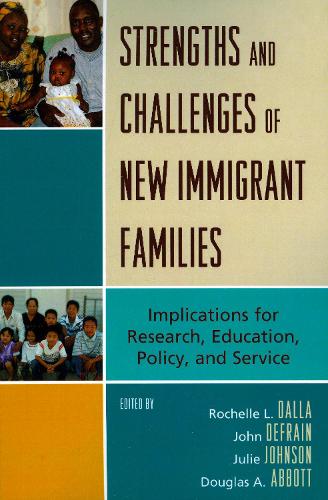
Strengths and Challenges of New Immigrant Families: Implications for Research, Education, Policy, and Service
(Paperback)
Publishing Details
Strengths and Challenges of New Immigrant Families: Implications for Research, Education, Policy, and Service
By (Author) Rochelle L. Dalla
Edited by John Defrain
Edited by Julie M. Johnson
Edited by Douglas A. Abbott
Contributions by Sayali S. Amarapurkar
Contributions by Laura Bates
Contributions by Libby Balter Blume
Contributions by Amy E. Boren
Contributions by Laura Thompson Brady
Contributions by Rodrigo Cantarero
Bloomsbury Publishing PLC
Lexington Books
16th July 2009
United States
Classifications
Professional and Scholarly
Non Fiction
Migration, immigration and emigration
Social research and statistics
306.85086912
Physical Properties
Paperback
440
Width 155mm, Height 233mm, Spine 33mm
660g
Description
Immigration to America is an issue that often sparks intense emotional reactionsfrom passion and compassion to anger and even rage. Often missing from the dialogue, however, is discussion of the strengths of immigrant newcomersthe abilities and positive characteristics they bring as individuals and families to our country, and how these contribute to the agency, growth, and vitality of America. This book was intended to move the discussion of immigration, generally speaking, and of immigrant families specifically, to include how and in what ways new immigrants to America (those arriving within the past thirty years) have changed the social and geocultural landscape of this country in positive, beneficial, and valuable ways.
The book is comprised of nineteen chapters written by scholars with expertise on immigrant families representing every corner of the globefrom Africa and India to Europe and Central America. In each chapter, the unique factors, processes, and worldviews which help shape and mold the immigrant experience are articulated, as are the strengths immigrant newcomers bring to America. In addition, beyond explicating the strengths of immigrant families, each of the nineteen contributing chapters focuses on the implications of these strengths for families, communities, and the culture. Thus, the book provides a springboard from which to answer the application and "what now" questions for those who work with immigrant families in a variety of capacitiesfrom academicians and researchers to educators and human-service providers.
Reviews
This book provides new insights into the contemporary US immigrant experience based on a range of research strategies. It presents a rich account of the lives of immigrants by bringing into focus the relevance of country of origin, immigration status, cultural practices, gender, family integration, urban vs. rural communities, and interactions with the social service system. It does so by exploring the lives of East Indian, Sudanese, Somali, African, Asian Indian, Korean, Irish, Egyptian, Israeli, Chinese, Mexican, and other immigrants. A wonderful introduction for those wanting to study or work with immigrant families. -- Yolanda C. Padilla, The University of Texas at Austin
Strengths and Challenges of New Immigrant Families is a multidisiplinary compendium of articles and essays about immigrants and refugee families....One value of the book is the inclusion of research on a number of understudied populations, such as Sudanese, Khmer, Somali, and Korean immigrants and refugees. -- Katherine Fennely, 2010 * Great Plains Research *
The editors have done a terrific job of compiling a wide range of complex and timely topics into a highly readable volume. Together, the chapters convey a multidimensional portrait of immigrant families that should be of interest to academics and policy makers alike. -- Cecilia Menjvar, University of California, Los Angeles
Author Bio
Rochelle L. Dalla is an associate professor; John DeFrain is an extension professor; Julie M. Johnson is chair and professor; Douglas A. Abbott is a professor, all in the Department of Child, Youth, and Family Studies at the University of Nebraska at Lincoln.
